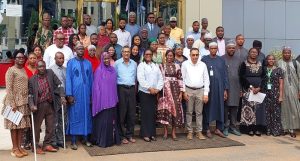To complete Nigeria’s task of preparing its first stand-alone biennial transparency report (BTR1) by 2024 and its combined second biennial transparency report and fourth national communication (BTR2/NC4) by 2026, the environment minister, Mohammed Abdullahi, has stated that the active participation of all stakeholders, directly or indirectly, in the project’s implementation is critical.

The minister cited the strong need for the development of the documents mentioned above under the Paris Agreement’s Enhanced Transparency Framework (ETF) as one of the grounds for his statement. According to the ETF’s modalities, procedures, and guidelines, everyone in the country is concerned about climate change, which is the second reason he stated for his motivation.
Speaking to participants at a two-day stakeholders’ workshop on developing Nigeria’s BTR1 and BTR2/NC4 in Abuja from May 11 to 12, 2023, and organised by the Federal Ministry of Environment’s Department of Climate Change (DCC), Abdullahi lamented that Nigeria is highly vulnerable to the effects of climate change and its phenomena, which manifest in rising sea levels, inundation of coastal lands by seawater, and flooding, all of which have negative impacts on food security, human health, and settlements.
The minister, who was represented by his special assistant on technical matters, Mrs. Halima Bawa-Bwari, stated that the country’s collective effort to achieve the Sustainable Development Goals (SDGs), particularly those related to poverty and hunger elimination and environmental sustainability, is hampered by environmental degradation.
“In order to monitor the nation’s progress toward fulfilling its obligations under the Paris Agreement, both reports are essential. They will demonstrate the great strides “our country has made to reduce greenhouse gas emissions, implement mitigation measures, and enhance our capacity to adapt to the impacts of climate change,” he said.
Abdullahi went on to say that the BTR1 and BTR2/NC4 will also prove Nigeria’s commitment to transparency and accountability by delivering accurate and timely information to the United Nations Framework Convention on Climate Change (UNFCCC).
Nigeria, as a Party to the UNFCCC, the Kyoto Protocol, and the Paris Agreement, submitted an ambitious Nationally Determined Contribution (NDC) in December 2015 and a revised NDC in 2021, committing the country to reduce greenhouse gas (GHG) emissions by 20% unconditionally below business as usual by 2030 and 47% with international support, the country’s environment chief hinted.
In further detail, he revealed that the NDC focuses on delivering direct development benefits and sustainable economic growth, including decentralised energy generation, climate-smart agriculture, the adoption of renewable energy and energy efficiency, improved freight infrastructure, and the development of robust urban transit systems for the country’s 50% urban population.
The minister hailed the NDC as a new paradigm shift that has encouraged proactive participation in climate action by all stakeholders, with enough backing from a combination of national, regional, and international alliances, including corporations.
As a result, Abdullahi asked all those in attendance to establish the project objectives, components, outputs, and activities, as well as identify the roles and responsibilities of all stakeholders for the project’s seamless execution.
“I would like to conclude by appreciating our development partners, the Global Environment Facility and the United Nations Development Programme (GEF-UNDP),” Abdullahi stated, “for their support in developing these reports for Nigeria.”
Mr. Charles Ikeah, the director overseeing the office of the permanent secretary (PS) of the Ministry, observed in his welcome address that the meeting would serve as a platform for sharing ideas, exchanging information, and building collaborations.
According to the PS, who was represented by Dr. Iniobong Abiola-Awe, the director in charge of the DCC, the development of the BTR1 and BTR2/NC4 reports will be crucial in helping the country understand the impact of its activities on the environment and communities.
“It is our hope that the meeting will help us identify key challenges and opportunities, as well as strategies to overcome them,” he said.
By Etta Michael Bisong, Abuja
